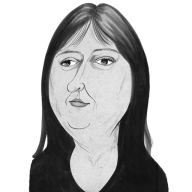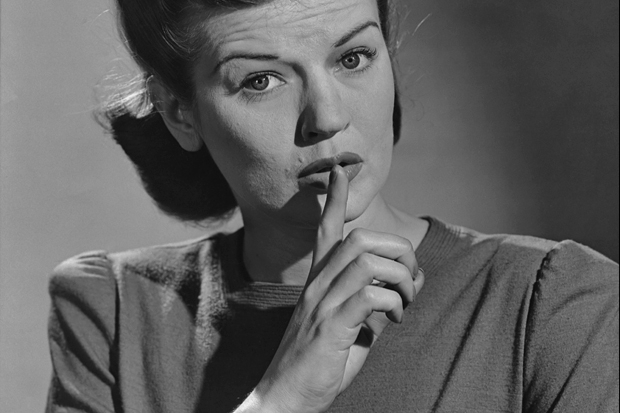When I told my friends that I was planning to attend a silent retreat, they all laughed. It’s true that I am something of a convivialist; my idea of heaven is a big table in a warm restaurant, the table shimmering with the laughter of friends and the glugging of wine, and me picking up the bill.
On the other hand, I was a solitary only child and I look back on those days with great fondness. Before the long stagger up the primrose path of pleasure started, the only companion I needed was a book; I well remember my mother crying because I preferred to sit in my room reading rather than hang around on street corners getting drunk and/or pregnant like a normal teenager. Imagine my dismay on discovering that the nearest silent retreat to me was a Catholic one, St Cuthman’s, within an hour of Brighton. But at least my antipathy to the religion would mean that there was no chance of me trying to engage anyone in theological debate, which might not be the case under the care of Protestants.
St Cuthman’s offers both quiet and silent retreats, but I decided that if I was going to do it, I was going to do it properly. I chose the 48-hour silent option on two weekdays in February; I didn’t take my laptop, just exercise books, my Hebrew textbooks and a carefully selected Iris Murdoch novel, A Fairly Honourable Defeat (hoping that the title wouldn’t be a self-fulfilling prophecy). In a Jacobean house smelling pleasingly of log fires, I found my monastic room — a single bed, a chair, a table — very restful. I sat down at the Catholic table and looked out over the Catholic lake with its Catholic swans, and felt pleasingly subversive as I tussled with Hebrew tenses.
After a while I went downstairs to be inducted, feeling mutinous. My mulishness grew as dishy blonde Mary-Jane, the director, told us over tea and biscuits that the house had once belonged to a community of Anglican missionaries and was ‘gifted’ to the Catholic Diocese of Arundel and Brighton when Cardinal Cormac Murphy-O’Connor was boss. As one whose idea of a good read is Foxe’s Book Of Martyrs, I felt my hackles rise, though I couldn’t actually pinpoint them on a map; even more so when I recalled that in the 1990s, O’Connor installed a paedophile priest, Father Michael Hill, in the chaplaincy at Gatwick Airport. Hill was subsequently convicted of sex attacks against nine children, some handicapped. So when Mary-Jane told us that we would be silent apart from our time with individual ‘spiritual directors’, I was just about ready to break out into a hearty chorus of ‘The Protestant Boys Are Loyal and True’, an instinct strengthened when M-J mentioned ‘Mass’. It’s childish, but I can’t hear the word without seeing an image of a sinister hooded being mucking about with a nubile girl on the cover of the Dennis Wheatley novels of my wasted youth. It was time for me to speak up.
‘I’d rather not be spiritually directed, thank you. Or attend prayers. Is it OK if I just read?’
M-J looked slightly surprised but said, ‘Of course!’
I went upstairs and started on the Murdoch. It happened straight away; I returned to the reading trance of my youth — not skimming, not speed reading, totally in the moment. What a relief! I read for hours and fell asleep, and woke up feeling very words-I-don’t-usually-use-ish: clarified, vivified, tranquil. In the spirit of getting with the programme, I perused the information folder: ‘Please note that we are not allowed to provide you with any medicines, not even an aspirin! You will be encouraged to call NHS Direct.’ As Mary-Jane had informed us earlier about the yearly pilgrimages to Lourdes that St Cuthman’s was involved in organising, I was disappointed that we weren’t encouraged to pray for a cure. I didn’t just stay in my room reading; I read in the hall, in front of a blazing fire, and in the drawing room, ditto. Most agreeably of all, I read in the library. My dedication to self-denial surprised me. I sneered at the payphone, and raised an eyebrow on finding instructions on where to get the best mobile signal in the grounds, and the nearest supplier of sweets and newspapers. As someone who has been spending like a sailor on shore leave for the past 30 years, it was strange to want nothing; not even the Neal’s Yard organic aroma-therapy candles jostling for attention with religious tracts in the modest shop — Balancing, Calming and Uplifting, £34.80 a throw — tempted me. I was relying on nothing more than the act of staring silently at a printed page to bring balance, calm and uplift.
Though I had fully intended to swerve the Papist hijinks in the nearby chapel, when the bell for morning prayers rang I found myself following the others; it seemed churlish not to give it a try. There was something moving about the plain trestle table with a candle at each end in front of a plain cross etched on a plain window — none of the frocked-up misogynists prancing around in thousands of pounds’ worth of bling and titfers I had expected. There were just six of us in the congregation, and Mary-Jane led the service sitting behind us rather than standing in front like a big old show-off: as we sang hymns, I thought of what Christians in the Middle East were going through, and I began to cry. (Silently, of course.)
This isn’t one of those I-was-lost-and-now-I’m-found sob stories; I wasn’t looking to be ‘healed’ and I’m not ‘stressed’ — my life is easy and enjoyable. The only ‘journey’ I was expecting to experience was the one from Brighton and back. In a way, this being a religious retreat, I wasn’t there for the ‘right’ reasons — it had been a sort of joke, a dare, a snook-cocking to the loved ones who tease me for being a chatterbox; I had prideful intentions, if you like. Whenever I read about some pampered hack bigging up some soppy old spa, I wonder why it is that the people who could use such ministrations the most seek them the least, and why the softer people’s lives are, the more ‘pampering’ (ick!) they appear to need.
But I did feel that being alone had steam-cleaned my mind. Because I had swerved smartphones, I thought I was smart — but I had in a way become my own smartphone, ceaselessly entertaining and distracting myself, never sticking at anything for long. I wasn’t seeking a ‘safe space’ but a quiet space, where I could get lost — and it would feel like coming home. And by Jove, I got it!
Julie Burchill’s most recent book is Unchosen: The Memoirs of a Philo-Semite.







Comments